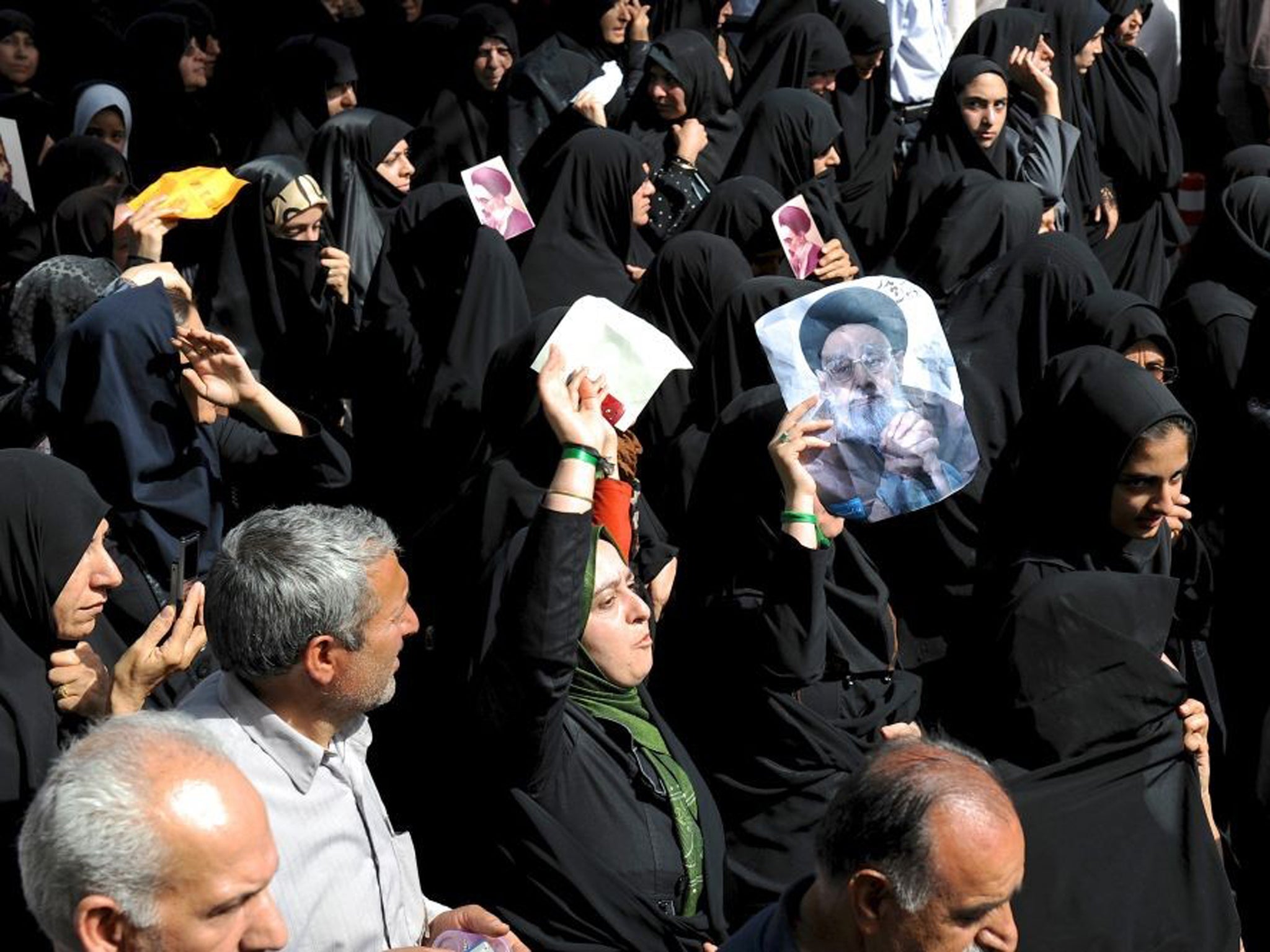Video: Iran funeral for dissident Ayatollah Jalaluddin Taheri turns into anti-government protest - only 10 days ahead of Iran's presidential elections
Crowds chant 'death to the dictator' in reference to supreme leader Ayatollah Ali Khamenei

Your support helps us to tell the story
From reproductive rights to climate change to Big Tech, The Independent is on the ground when the story is developing. Whether it's investigating the financials of Elon Musk's pro-Trump PAC or producing our latest documentary, 'The A Word', which shines a light on the American women fighting for reproductive rights, we know how important it is to parse out the facts from the messaging.
At such a critical moment in US history, we need reporters on the ground. Your donation allows us to keep sending journalists to speak to both sides of the story.
The Independent is trusted by Americans across the entire political spectrum. And unlike many other quality news outlets, we choose not to lock Americans out of our reporting and analysis with paywalls. We believe quality journalism should be available to everyone, paid for by those who can afford it.
Your support makes all the difference.The biggest anti-regime demonstrations for years have taken place in Iran, just days before the country heads to the polls in controversial presidential elections.
Tens of thousands are reported to have taken to the streets in the central city of Isfahan following the funeral of a dissident cleric, Ayatollah Jalauddin Taheri. Chanting “death to the dictator” – a reference to Iran’s supreme leader Ayatollah Ali Khamenei – and holding up banners, the demonstrations took place yesterday, Tuesday.
Iran’s elections are scheduled to take place on 14 June with only eight candidates given the go-ahead to stand – each of them has been approved by Tehran’s Guardian Council - and all are all considered to be strongly conservative.
Nonetheless, the demonstration appears to have taken the authorities by surprise and suggests that resentment against the regime, which surfaced in the form of mass demonstrations in 2009, is still rife. There must be concern in establishment circles that the result of next week’s poll will also lead to popular unrest.
“This was a surprise in the sense that any sort of demonstration that is not repressed by the regime is a rarity,” said Sir Richard Dalton, Britain’s ambassador to Iran between 2002 and 2006, and now associate fellow on the Middle East and North African programme at Chatham House.
“Though one can quite see why the police in this instance would not want to wade in. It was probably a very sensible decision: the situation could have been the spark for others to come out on to the streets – just look at what happened recently in Turkey.”
A number of reformist candidates have been barred from standing in the presidential elections, a point that appears to have disgruntled those taking part in the rally. Among other slogans, they chanted: “the political prisoners must freed,” and, “Mousavi and Karroubi must be freed,” a reference to the leaders of the reformist Green Movement – the name given to the popular protests in 2009 when three million demonstrated after current president Mahmoud Ahmadinejad was returned to power. Mr Ahmadinejad is barred from standing this time, having already served two consecutive terms.
Many liberals in Iran considered the elections a stitch-up and two of the reformist candidates who lost the election, Mir Hossein Mousavi and Mehdi Karroubi, encouraged their supporters on the to the streets after Mr Ahmadinejad claimed that two-thirds of ballots had been cast in his favour. The protests were the largest in Iran since the 1979 Revolution.
A second televised debate between the candidates took place yesterday, less than a week after the first when several complained that the format was demeaning. Yesterday’s debate included a section where each candidate was shown an image and was asked to describe what first entered their minds.
The frontrunner is thought to be Saeed Jalili, the head of Iran’s nuclear negotiating team, which for the best part of a decade has been involved in protracted talks with world powers over Tehran’s nuclear weapons ambitions. Mr Jalili insists Iran’s nuclear programme is designed for purely peaceful means, while most Western countries insist that the Islamic Republic harbours ambitions to build a nuclear weapon.
In response to a rival’s suggestion yesterday that Iran ought to consider cultural developments elsewhere in the world, Mr Jalili hit back: “Our cultural discussion is too narrow. We have much more to be proud of.”
Experts doubt that the result this time is likely to lead to more unrest. Firstly, there is no true liberal candidate to support and conditions this time are different, says Sir Richard Dalton. “Firstly, people will be tied down by the apparatus of the state,” he said.
“Secondly, people tend not to rebel when economic circumstances in Iran are hard. People usually come out on the streets when their ambitions are thwarted by the state.”
Sir Richard says that while the Iranian economy has been the victim of general mismanagement, Western imposed sanctions, in response to the nuclear programme, “are by far the biggest reason,” for the lack of growth. On Monday, the US announced a new raft of measures designed to stymie Iran’s currency, and car industry.
“Even as we intensify our pressure on the Iranian government, we hold the door open to a diplomatic solution that allows Iran to re-join the community of nations if they meet their obligations. However, Iran must understand that time is not unlimited,” said White House press secretary Jay Carney.
Join our commenting forum
Join thought-provoking conversations, follow other Independent readers and see their replies
Comments